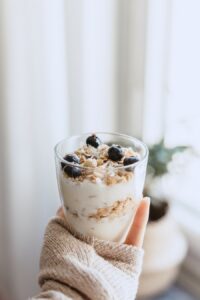Mental health and nutrition go hand in hand. You’re probably thinking, what does nutrition have to do with mental health? Let’s dive into that.
As a mental health therapist, I have a holistic approach to health. Mental health isn’t just about the mind. It’s about the whole body. Disclaimer: I’m not a nutritionist or a dietician. I’m sharing what has worked for me and also what I’ve studied in relation to mental health.
I want to share some things that are really important to your nutritional journey when it comes to your mental health. And some of it might be shocking. Just remember, this is not about punishment. This is about feeling good in our bodies. Just like a car needs gas, humans need food.
These five nutritional aspects have made the most impact in my journey and are shown to be beneficial to everyone:
1) Eat more plants.
Plant diversity is a huge contributing factor to health and longevity.
I know what you’re thinking: “I don’t like vegetables.” I get that all the time and I get it. I didn’t used to like vegetables either! Truthfully the only vegetable I used to eat was green beans. So I get. But I learned I just didn’t know how I did like them! When I found how I like vegetables, I actually started to enjoy them.
Let me say here, plants are not only vegetables. Plants are fruits, vegetables, whole grains, nuts, anything that gross from the ground. Plants fuel your gut! We will talk more about the gut later…
One thing to avoid is eating foods your hate. If you are eating foods you hate, you won’t be consistent and you won’t stick with it. I do not like raw vegetables but I love cooked vegetables with some seasoning. Don’t rule out foods until you’ve tried them different ways and found a way you like them.
I feel my best when I have more fruits and vegetables versus things like pizza and ice cream. Pay attention to how you feel when you eat these things with more nutrients versus not so many nutrients.
And I’m not saying to restrict, I’m not saying not to enjoy your food. I’m just saying we need to fuel our gut with plants and focus on the feeling. This isn’t about looking a certain way. It’s about feeling good in our skin.
2) Decrease refined sugar.
On average, a person consumes 130 pounds of sugar a year compared to 20 pounds in 1820. So over the past hundred years, we’ve increased the amount of sugar, a person consumes per year by a hundred pounds. That’s insane! Adults are recommended 10 teaspoons per day, but on average, consume 22 per day.
Here’s the thing about sugar. Sugar uses the bodies vitamins and minerals, leaving none for the body. A lack of vitamins and minerals can lead to fatigue, irritability, acne, joint pain, sleeping problems, digestive issues, brain fog, and so much more.
A lot of people who are anti diet culture claim that sugar isn’t bad. And hear me say, I am not pro diet culture. I am so far from it, but I’m also not pro sugar. I don’t want these symptoms. And I’m assuming that you don’t either. There’s nothing wrong with reducing sugar, for the purpose of feeling better in your body.
And I want to make a differentiation here. I’m not talking about things like fruit and natural sugars. I’m talking about refined and processed sugars. That’s where all the added sugar comes from.
Producers throw added sugar into products a lot, without us even realizing it it’s in things that you would never imagine. Whenever you’re looking at a package, just be conscious of the ADDED sugar.
3) The Gut-Brain Connection.
70% of the immune system lives in the gut and the gut and the brain are directly connected. So that means that food affects our health, our brain, our mood, and our well-being. Food is vital to living our best lives.
This is not diet culture. It’s not a conspiracy. It’s science. This is how we create happiness and health: by fueling our gut and taking care of ourselves.
4) How nutrition effects mental health.
1 in 10 Americans experiences depression, and this increases by 20% every year. Foods like fried food, sweetened beverages and processed foods are shown to actually increase depression.
A person eating a Western diet, which is consisting of mostly the things like fried foods and processed foods, are 50% more likely to have depression. 50%! There is a direct connection between these processed foods and a decline in mental health.
Another aspect of mental health to be aware of is that vitamin B can look a lot like symptoms of depression. So it’s really important to rule out nutritional deficiencies before being diagnosed with the mental health disorder.
As a mental health therapist, I’m all for getting help with mental health. And I have nothing against being diagnosed with the mental health disorder, but we have to rule out other things before we can start work on the mental.
5) Balance.
Maybe the biggest thing I’ve learned in my wellness journey is that it’s all about balance.
It’s not that I can never have ice cream. I just shouldn’t have it two times a day or even every day. Again, it’s not because I will gain weight, but because I won’t feel good and my body will be inflamed.
I find balance in my nutrition every day because I love the foods I eat. I do not deprive myself! I don’t restrict. I enjoy some dark chocolate every day, but I also eat several servings of veggies. I enjoy pizza maybe once a week and I don’t restrict around the times that I enjoy things like pizza.
It’s not a treat it’s food. You can enjoy food and fuel your body at the same time.
Lets look at some tips that can help you get started in balancing your nutrition and your mental health.
- Starts small. Add one food at a time or one habit at a time. If you add a bunch of things at once, you’re going to be overwhelmed. You’re not going to enjoy it and you’re going to quit.
So start with one. I recommend starting by adding just a glass of water in the morning. After a couple weeks, add a vegetable to each meal. After a couple more weeks, you can add something else, but it’s all about consistency and not overwhelming yourself.
Adding is easier than taking out. So start by adding the good stuff. Then after you have created these habits, you can start eliminating.
- Avoid counting calories or restricting calories. Don’t skip meals. Don’t eliminate food groups. We need all of our food groups. Just remember it’s all about balance.
I hope that these tips help you to get started in fueling your body and thereby fueling your mental health. If you have any questions, feel free to reach out.





